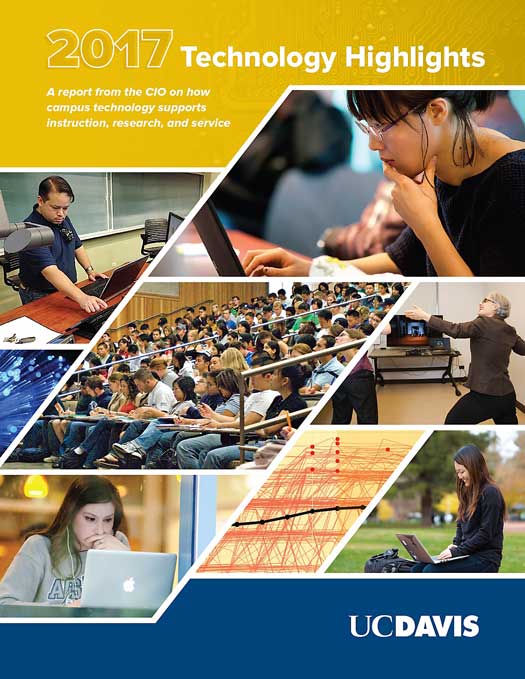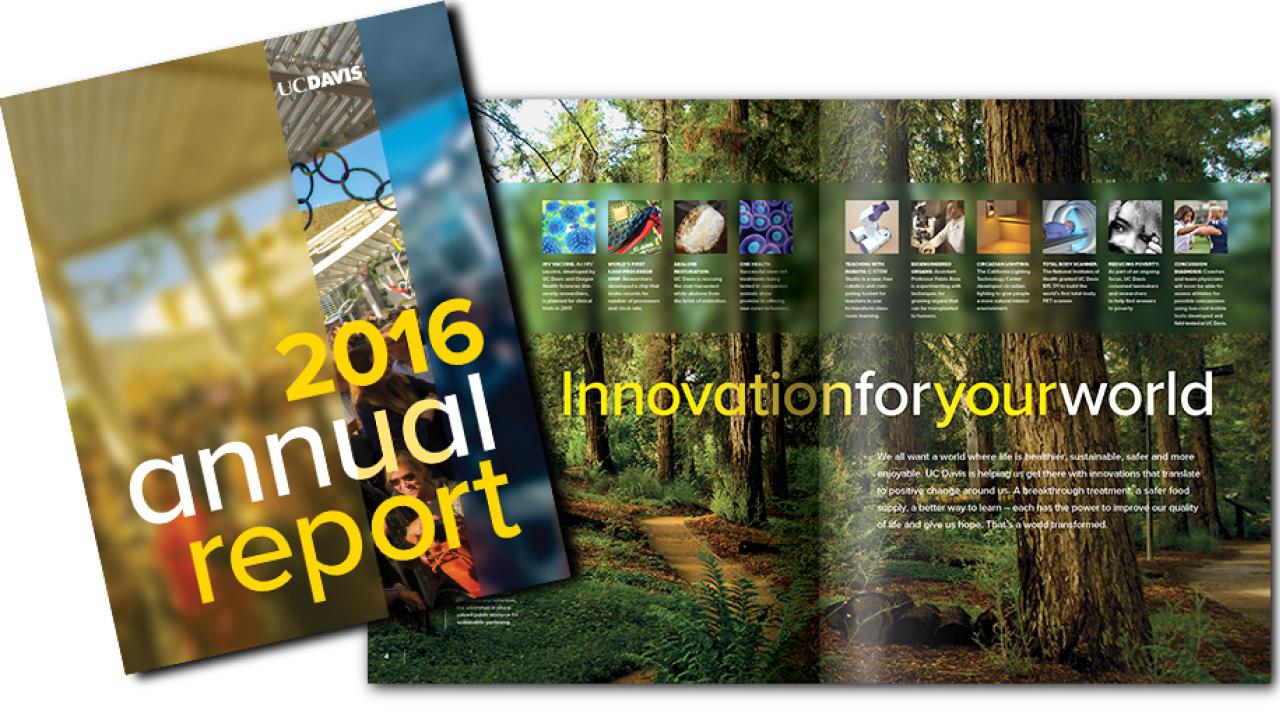Quick Summary
- March 8 town hall on proposals for Diversity and Inclusion Innovation Grants
- Administrative app team unveils academic scheduling tool, called IPA for short
- 10 students emerge from Grad Slam qualifying to make the campus's April 14 final
UC Davis’ newest annual report has been published and is available online for all to see.
“With this report, we highlight just some of the many proud accomplishments achieved by our faculty, students and staff as we work to fulfill the land-grant mission to make the world a better place for as many people as possible,” Interim Chancellor Ralph J. Hexter wrote in the introduction.
The 2016 report comprises sections titled “Innovation for Your World,” “Building Community,” “Reimagining the Classroom,” “Growing a Better Future” and “Creating a Healthier World,” “One Health for All” and “Energizing Environmental Leadership,” all set against striking photography.
The report also includes key statistics and financial data at a glance.

The highlights are not limited to IET projects. One article, for example, is about “Play the Knave,” Gina Bloom’s game-ified version of Shakespeare. Bloom is an associate professor of English, using technology to expand the study of drama.
The report includes a snapshot of how students use tech in 2017, along with a map with statistics from campus IT. And there’s an online game, too, to show that reports about technology don’t have to be dense.
Read more about the Technology Highlights report.
March 8: Hear proposals for diversity-inclusion grants
Staff, faculty and students are invited to public presentations Wednesday (March 8) on proposals for Diversity and Inclusion Innovation Grants. “We are soliciting public feedback to guide the final selection process, as well as to connect interested community members with projects and proposals they might want to engage with,” said Brittany Derieg, assistant director of strategic initiatives in the Office of Student Affairs and Campus Diversity.
The Diversity and Inclusion Committee received 109 proposals in all: 37 percent with students as the leads, 14 percent from faculty and 49 percent from staff and post-doctoral scholars. The total ask: $445,899.
The committee has narrowed the proposals to 60 for public presentations, and these proposals are vying for shares of a grant pool of $50,000.
The presentations are scheduled from 10 a.m. to 2 p.m. in Ballrooms A and B and Conference Room 1 at the Activities and Recreation Center. People are invited to drop in and spend as much time as they can. The proposals are summarized here, on a webpage that also provides the schedule for the presentations.
Administrative app team unveils academic scheduling tool
A town hall will be held Friday, March 17, to present the university’s new Instructional Planning and Administration web application designed to make all aspects of academic scheduling faster and easier. The town hall is for everyone involved in the process of planning course offerings, teaching assignments, course scheduling and TA assignments.
The meeting will be held from 9 to 10 a.m. in 3001 Plant and Environmental Sciences Building.
Sponsored by the Administrative Application Development Initiative, the IPA tool is a collaborative effort of staff from academic departments across the campus. The technical team is housed in Jeremy Phillips’ IT group in the Division of Social Sciences.
IPA can analyze historical enrollment trends to help you decide how many seats are needed for future course offerings. It can collect instructor and teaching assistant preferences and help quickly determine who can teach what class. It can help you better understand the costs associated with your academic planning and help ensure a clearer understanding of your scheduling data.
This tool is currently in the pilot phase. The Course Offerings, Teaching Call, Teaching Assignments and Course Scheduling modules have been built, and the TA Call/Assignments and Budget pieces are in progress.
The tool is expected to be ready for broader campus use by September, in time to develop 2018-19 Instructional Plans. It is a voluntary use application and will be available at no charge to departments.
More information is available online.
Campus Grad Slam has its 10 finalists
Graduate Studies has announced the 10 finalists in this year’s UC Davis Grad Slam. The winner will have the opportunity to compete in the UC Grad Slam.
The UC Davis finalists and their graduate programs: Carina Fish and Mike Huh, Geology; Donald Gibson and Sam Westreich, Integrative Genetics and Genomics; Omar Hafez and Youyou Zhang, Civil Engineering; Maci Mueller, Animal Biology; Marc Pollack, Microbiology; Telha Rehman, Horticulture and Agronomy; and Alex Schmidt, Mechanical and Aerospace Engineering.
The contest asks master’s and doctoral students in any discipline — hard science to humanities — to present their research in three minutes or less, covering the significance and fundamental points, and keeping it interesting for a general audience.
This year’s UC Davis Grad Slam drew more than 80 proposals, more than double last year’s number. The first test came in qualifying Feb. 28 at the Activities and Recreation Center, where faculty and staff volunteer judges winnowed the field to 10.
They’ll compete in the campus final from 1 to 2 p.m. Friday, April 14, at the Jan Shrem and Maria Manetti Shrem Museum of Art. Admission is free and open to the public; registration can be arranged online.
The campus will award $1,000 for first place, $500 for second and $250 for third — and the first-place winner will have a shot at the UC Grad Slam’s prize pool of $10,000 (including $5,000 for the winner).
